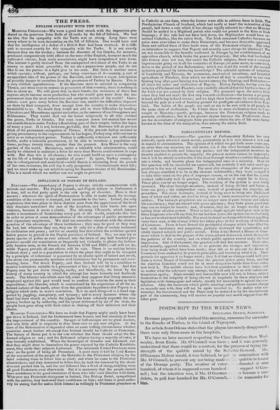ENGLISH SYMPATHY WITH THE TURKS.
THE PRESS.
• MORNING CHRONICLE—We were a good deal struck with the impression pro- duced on the generous john Bulls of all ranks by the fall of Silistria. We had no idea that the sympathy with the Turks was so strong. Long faces were every where to be seen descanting on the fall of Silistria. One would have said that the intelligence of a defeat of a British fleet had been received. It is diffi- cult to account exactly for this sympathy with the Turks. It is not exactly because they are the weaker; because the disasters of the Greeks, for instance, produced comparatively little effect on the mass of the English, however much the cultivated classes, from early associations, might have sympathised with them. The interest is partly.derived from the unexpected resistance of the Turks to an enemy so much more powerful ; for we are a pugnacious people, and do not like to see the parties in a fight give in too soon. But there is another cause which operates, without, perhaps, our being conscious of it—namely, a sort of exaggerated idea of the power of the Russians, and thence a vague anticipation of possible danger to ourselves from the possession of Turkey by Russia. This is a very childish apprehension. If the Russians were to succeed in conquering Thrace, and were even to remain in possession of that country, there is nothing in this to alarm us. We will grant that, in their hands, the resources of these tine regions might become more productive, but who would gain more from the im- provement than the most industrious and energetic nation of the world? Gene- rations must pass away before the Russians can, amidst the difficulties imposed on them by their conquest, draw enough from the country to make themselves formidable to us. No doubt they would not add to their difficulties by banding Christians and Mussulmans against each other, in the manner of our Orangemen and Ribbonmen. They would deal out the knout religiously to all who violated the peace, Turks or Greeks. But even common sense and martial law would not enable them to make Turkey a flourishing part of their empire before the lapse of many a year. It is no however, probable, that the Russians will at present think of the permanent occupation of Thrace. If the present Sultan succeed in giving permanency to the improvements he has begun, Turkey may still continue to exist as an independent power. Turkey is sufficiently extensive and sufficiently fertile, under a tolerable government, to be able to maintain a populatiun ten times, perhaps twenty times, greater than the present. Asia Minor is the very garden of the world. Resources, under a tolerably wise administration, could easily be obtained to maintain a force far more than Russia could venture to cope with. But then this is all chance • for who would build on such a contingency as the life of a Sultan for any number of years? If, again, Turkey remain as she is—disorganised and anarchical—while Russia is advancing from the growth of her own resources, the evil day is only postponed. Constantinople must fall ; and we must make up our minds to seeing the Russians master of the Dardanelles. This is a result which we neither can nor ought to prevent.


















 Previous page
Previous page